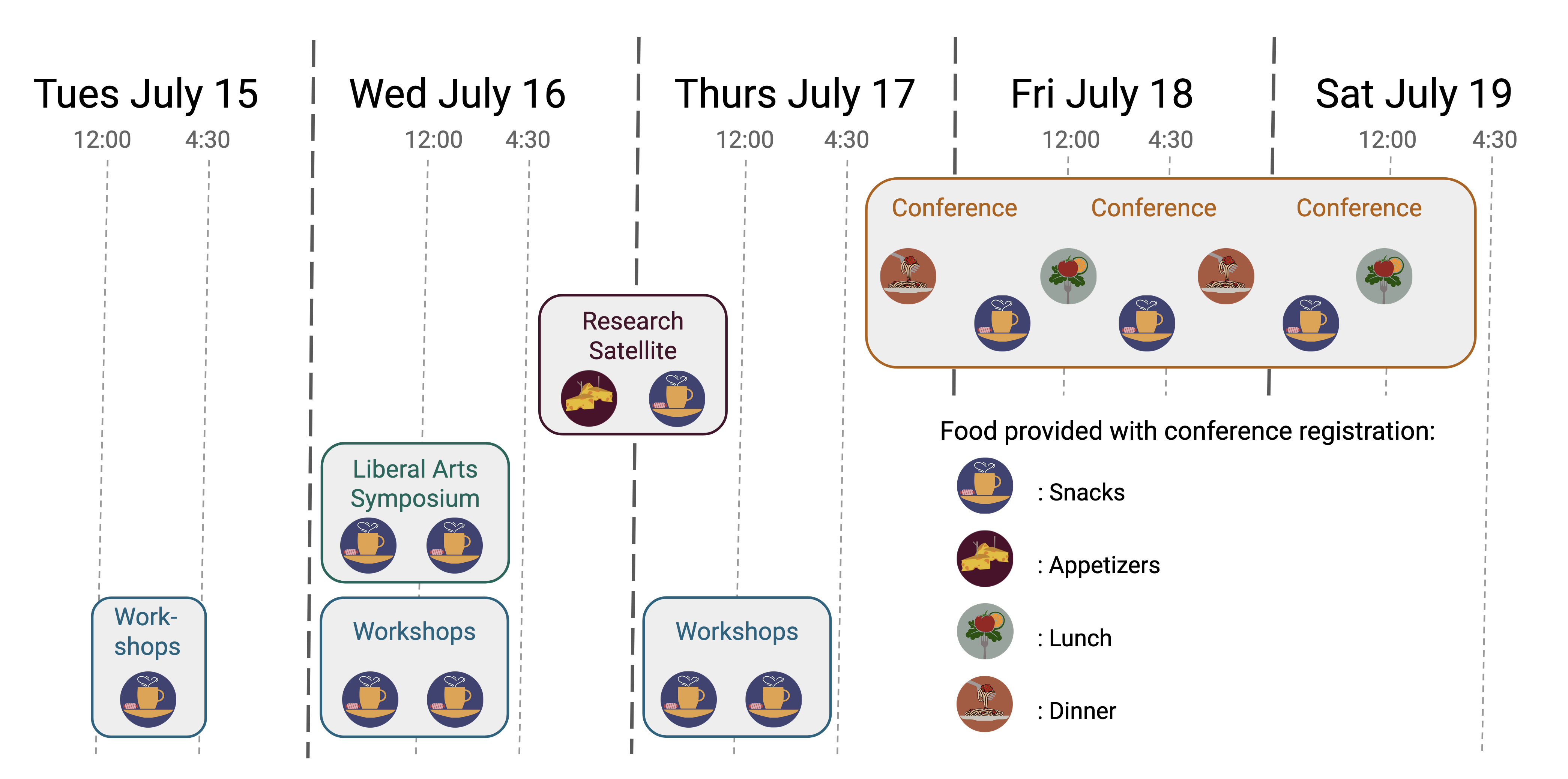Since 2005, CAUSE has organized the US Conference on Teaching Statistics (USCOTS), which brings together teachers of statistics and data science to exchange ideas about improving their teaching. The conference features thought-provoking keynote presentations, interactive breakout sessions, informative posters-and-beyond sessions, and exhibitor technology demonstrations. Other highlights of the conference include opening and closing sessions of inspiring five-minute talks, a banquet with an after-dinner speaker and awards, and birds-of-a-feather lunch discussions. The 2025 USCOTS will also feature a Research Satellite and a Liberal Arts Symposium.
This conference is intended for all who are interested in teaching statistics at all levels, including teachers at high schools, two-year colleges, and four-year colleges and universities. Graduate students and undergraduates who are interested in teaching are also encouraged to attend. We trust that you will find USCOTS a very welcoming, interactive, and fun environment. We hope that you will meet new colleagues and renew friendships with peers who are united by a common desire to teach statistics and data science effectively to the next generation of citizens and data professionals.
About the 2025 Theme
George Box famously said that “all models are wrong, but some are useful”. Because models abound in the practice and teaching of statistics, and because Box’s wise words have benefited generations of statisticians and teachers, we have selected Useful Models as the theme for USCOTS 2025.
What kinds of models do we have in mind? The short answer is: any and all models that have any relevance to the teaching of statistics and data science. For a longer answer, we will list some examples, but please focus on the short answer.
Foremost in our minds is the teaching of statistical modeling. We include simple models encountered in most introductory courses, from coin-flipping models for analyzing yes/no data, to bell-shaped-curve models for the distribution of a continuous variable, to least-squares lines for modeling the relationship between two variables. Moving beyond introductory courses, we expect some sessions to delve into more advanced statistical models, such as generalized linear models and multi-level models. We also invite sessions that address the entire process of statistical modeling, with all of the aspects that this rich process entails.
But that’s not all we mean by the “Useful Models” theme. This conference focuses on teaching and learning, so we also expect to have sessions on pedagogical models, curricular models, learning and development models, and more.
That’s still not all that “Useful Models” means to us. The world of statistics, and the world of education, and the larger world in general, will be very different in 2025 than they were during the first USCOTS in 2005. Accordingly, we will include sessions on the most popular and consequential types of models to emerge in the last few years: Large Language Models (LLMs).
We have certainly not provided an exhaustive list of the types of models that we hope to see at USCOTS 2025. To repeat our earlier sentiment: We invite sessions on any and all Useful Models that pertain to the teaching and learning of statistics.
Timing of Conference Events
The main conference will take place from the evening of Thursday, July 17th to late afternoon of Saturday, July 19th. Starting on Tuesday, July 15th, there will be several engaging pre-conference events: workshops, the liberal arts symposium, and the research satellite. The following schedule map provides the timing of the various events, along with when food is provided. Note: The food icons specify the meal type, such as snacks, not the exact food items that will be served.

Program Committee
USCOTS Program Chairs
- Allan Rossman, Cal Poly - San Luis Obispo
- Kelly McConville, Bucknell University
Local Arrangements Coordinator
Laura Ziegler, Iowa State University
Breakout Sessions
- Bradford Dykes, Grand Valley State University
- Ciaran Evans, Wake Forest University
- Rachel Saidi, Montgomery College
Posters & Beyond
- Heather Cook, University of Southern Indiana
- Jackie Herman, Northern Kentucky University
Workshops
- Ann Cannon, Cornell College
- Becky Tang, Middlebury College
- Dan Petrak, Des Moines Area Community College
Community Engagement
- Sunghwan Byun, North Carolina State University
- Wendy Moore, Cal State - East Bay
Research Satellite
- Jenny Green, Michigan State University
- Laura Le, University of Minnesota
Liberal Arts Symposium
- Alicia Johnson, Macalester College
- Paul Roback, St. Olaf College
Local Organizing Committee
- Amy Froelich, Iowa State University
- Anna Peterson, Iowa State University
- Laura Ziegler, Iowa State University
- Ulrike Genschel, Iowa State University
- Wesley Cox, Iowa State University
Posters & Beyond Review Committee
- Alex Fisher, Duke University
- Anelise Guimarães Sabbag, Cal Poly - San Luis Obispo
- Bethany White, University of Toronto
- Chris Malone, Winona State University
- Elijah Meyer, North Carolina State University
- Ioanna Papatsouma, Imperial College London
- Krista Varanyak, University of Virginia
- Leigh Johnson, Capital University
- Maria Ferrara, University of Virginia
- Marian Frazier, Denison University
- Scott Alberts, Truman State University
- Yue Jiang, Duke University
Registration Organizer and Website Developer
- Andrew Ferguson, Penn State University
